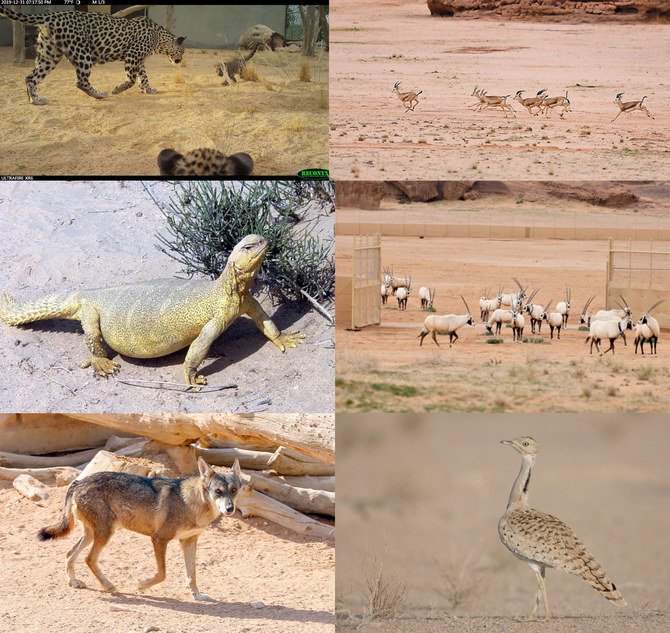RIYADH: Though far from the wild tundra of Alaska and the wide grasslands of South Africa, Saudi Arabia still offers hunters and falconers an engaging hunting experience. Hunting has been a popular activity in the country for many years, attracting both locals and tourists.
However, hunting can also have a severe negative impact on native wildlife. Overhunting in the past led to the serious decline of many species, from the Arabian leopard to the ibex and oryx.
In recent times, along with a multitude of other eco-friendly measures, the Kingdom has implemented strict rules and regulations governing animal hunting to ensure the sustainability of wildlife populations and protect endangered species.
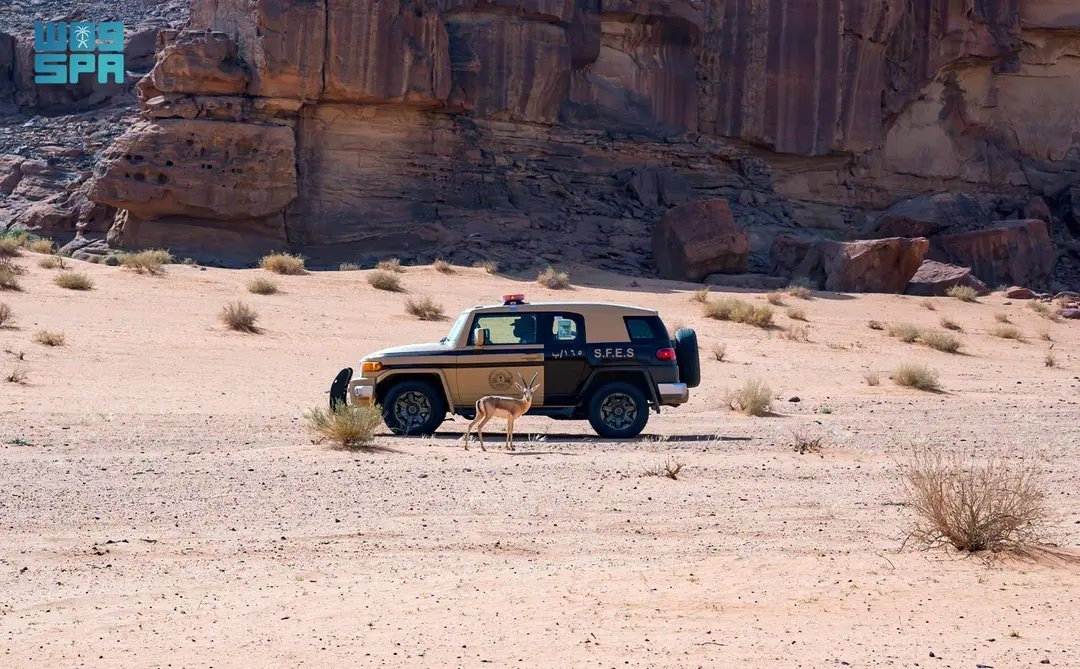
The Special Forces for Environmental Security agency is helping the Kingdom enforce wildlife-protection regulations. (SPA)
Hunting laws and regulations
In Saudi Arabia, individuals who wish to engage in hunting must first obtain necessary permits from the authorities. There are two main types of hunting permits available — recreational permits for personal use and commercial permits for hunting activities conducted for profit.
Certain hunting practices are strictly prohibited, such as using automatic weapons, hunting during breeding seasons, and targeting endangered species. Bag limits and size restrictions are also in place for different game species to prevent excessive hunting and maintain healthy population levels.
Opinion
This section contains relevant reference points, placed in (Opinion field)
Furthermore, safety regulations, such as wearing appropriate hunting gear and practicing firearm safety, are enforced to protect both hunters and the surrounding environment.
Violators of these laws can expect fines and the confiscation of their hunting equipment, with hunting without a license using firearms costing rule-breakers $21,300. Poaching or hunting protected species can lead to substantial fines and even imprisonment.
DID YOUKNOW?
Prohibited for hunting at any time: Animals include Arabian leopards, hyenas, wolves, jackals, lynxes, sand cats, martens, and honey badgers. Gazelles include Arabian oryx, reem (sand) gazelle, mountain gazelle, and Nubian and Persian gazelles. Every type of indigenous bird.
The fine for unauthorized hunting in Saudi Arabia is SR10,000 ($2,666). The fine for harming living animals is from SR1,500 to SR200,000.
Hunting is permitted in places designated by the National Center for Wildlife and announced periodically.
Hunting pregnant females of wild animal species, as well as interfering with their nests, eggs, or habitats, is strictly prohibited.
Earlier this year, the NCW’s campaign #ProtectSaudiWildlife asked everyone to pledge to protect and conserve the rich biodiversity of Saudi Arabia.
At the beginning of each wild hunting season, the center issues a list of the types of wild animal species permitted to be hunted during the wild hunting season, and the quantities during the license validity period.
Law enforcement and monitoring
These laws and regulations are enforced by Saudi Arabia’s Special Forces for Environmental Security, or SFES. Using modern technology and social media, SFES has enhanced its outreach, enabling it to intervene in illegal activities such as hunting, logging, and the sale of wild animals, thereby safeguarding the country’s rich biological diversity.
Patrol activities have been initiated across various provinces to ensure the adherence to conservation laws, reflecting a proactive approach to wildlife management. This month, the SFES announced the arrest of two Saudi citizens for hunting without licenses inside the King Salman Royal Natural Reserve.
The SFES also enforces the Kingdom’s other environmental laws, including illegal logging and grazing of livestock in prohibited areas.
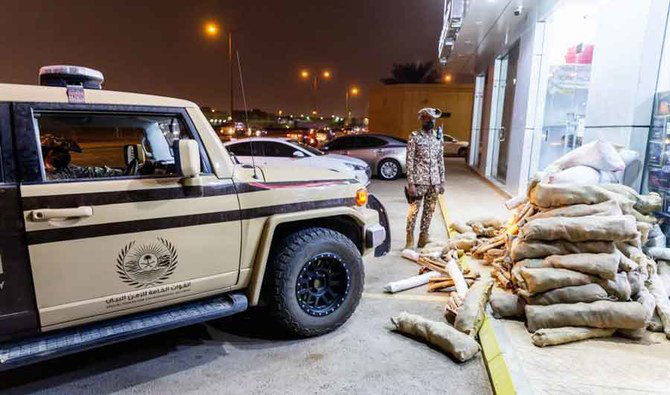
The Special Forces for Environmental Security agency is helping the Kingdom enforce wildlife-protection regulations. (SPA)
Protected species and environmental havens
Various types of animals are protected under special laws, including endangered species such as Arabian leopards, Arabian wolves, and the terrestrial birds known as houbara bustard. Through the implementation of hunting regulations, the country has witnessed the revival of populations of endangered species such as the famed Arabian oryx.
Abdulmajeed Al-Dhaban, executive vice president of operations at the Imam Turki bin Abdullah Royal Nature Reserve, praised the Kingdom’s strict hunting laws and highlighted the central role they play in the protection of the natural environment of the region.
The Imam Turki bin Abdullah Royal Nature Reserve, established in 2018, is a more than 91,000 sq km eco-tourism reserve dedicated to protecting the more than 180 plant and 60 animal species living within its borders
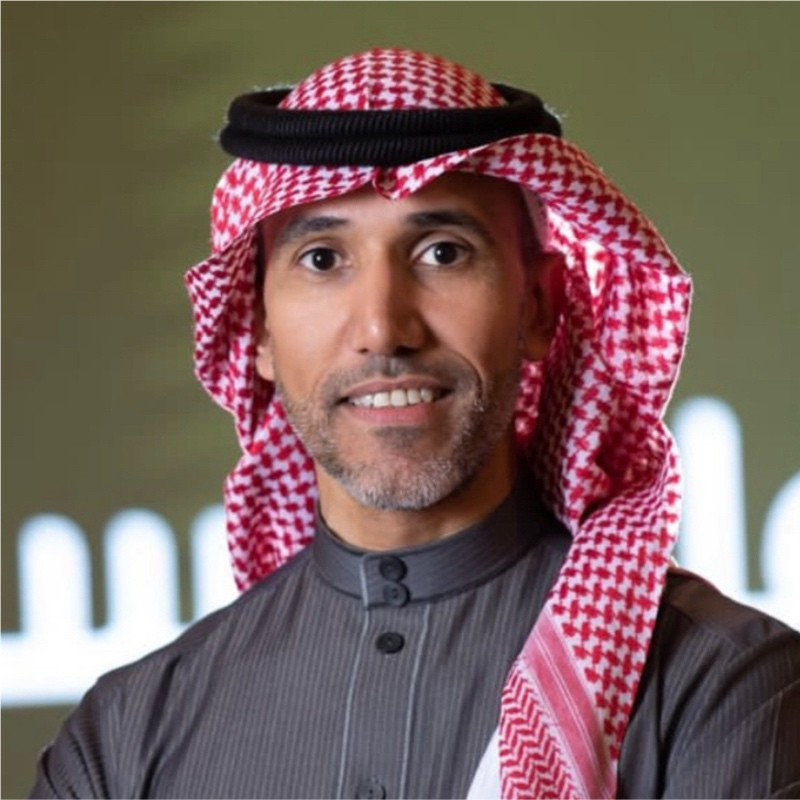
Abdulmajeed Al-Dhaban, executive vice president of operations at the Imam Turki bin Abdullah Royal Nature Reserve. (Supplied)
The reserve is also governed by a comprehensive set of regulations covering beekeeping, entry and transit, grazing, visiting and camping, recreational activities, and sustainable fishing.
“By establishing these integrated guidelines, we aim to strike a careful balance between preserving the reserve’s delicate ecosystems and allowing controlled public access and use. Our goal is to safeguard the natural wonders of this protected area while also facilitating responsible enjoyment and appreciation by the local community and visitors,” Al-Dhaban told Arab News.
The reserve was used for a groundbreaking conservation program — the reintroduction of the Arabian oryx, which had been extinct in the wild since 1972. Since its establishment in 2021, the program has reintroduced hundreds of oryxes back into their natural habitat.
Fines for huntingprotected birds and animals
Arabian leopard SR40,000 ($10,664)
Arabian oryx SR70,000 ($18,662)
Arabian wolf SR80,000 ($21,328)
Arabian sand gazelle SR25,000 ($6,665)
Houbara bustard SR25,000 ($6,665)
Spiny-tailed lizard SR3,000 ($799)
Community engagement
Saudi Arabia has also engaged in joint conservation projects with entities such as the World Wildlife Fund and the International Union for Conservation of Nature.
However, those in the Kingdom dedicated to conservation stress the need for a community-based approach, with Saudi Arabia’s own citizens getting involved.
“At the Imam Turki bin Abdullah Royal Reserve Development Authority, we’re deeply committed to cultivating environmental awareness and engaging the community in our initiatives,” Al-Dhaban said.
“Our goal is to contribute to sustainable development and environmental protection through a diverse array of beneficial projects. We firmly believe that empowering the community to participate in these efforts is key to making a lasting, positive impact.”

The King Khaled and Imam Abdulaziz bin Mohammed royal reserves have several tourist attractions, organized with local businesses, including stargazing, camping, safaris, hiking, and horse and camel riding. (IARDA PHOTO)
The authority’s main priority is to sustain the preservation for future generations through initiatives, projects, and events organized throughout the year with the participation of individuals from all age groups.
“The Imam Turki bin Abdullah Royal Reserve Development Authority is keen to raise awareness among young people and children of the importance of preserving the purity of nature and promoting their sense of responsibility from a young age toward the environment, wildlife and innate organisms, the attack on which is contrary to religious values and human principles. A simplified awareness-raising content is provided that explains the importance of preserving wildlife and flora and the individual’s responsibility toward the environment,” Al-Dhaban said.
Throughout the year, the Imam Turki bin Abdullah Royal Reserve Development Authority organizes numerous events such as the Zubaida Trail Winter Festival and celebrations of holidays such as Eid Al-Adha, all of which include many activities that integrate environmental awareness, education, and recreation for the whole family.
One of the authority’s most recent projects, launched in May in partnership with the National Center for Vegetation Cover Development and Combating Desertification, is a tree-planting initiative with the participation of primary school students.
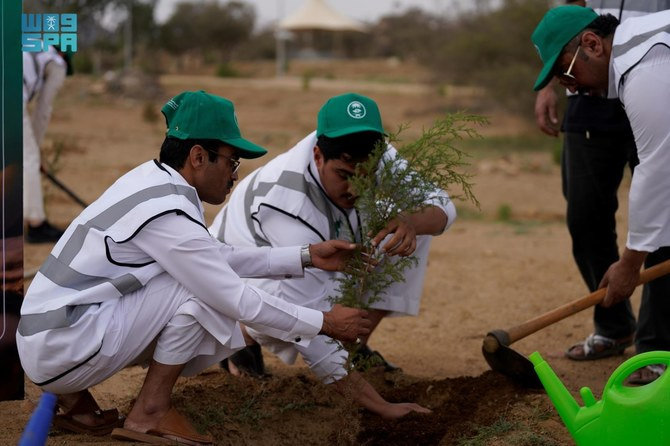
The Saudi Green Initiative Day reflects Saudi Arabia’s vision and dedication to fostering a culture of sustainability. (SPA)
“This was not the first time that the reserve had organized afforestation and seedling farming initiatives with the participation of community volunteers, as the Imam Turki bin Abdullah Royal Reserve has so far grown more than 600,000 trees,” Al-Dhaban said
Ecotourism
As Saudi Arabia’s tourism industry grows under the goals of Saudi Vision 2030, so too does the ecotourism trend in the country.
The Imam Turki bin Abdullah Royal Reserve Development Authority supports productive families and entrepreneurs through interactive initiatives aimed at developing job skills, which in turn enable the protection of the natural environment, biodiversity, and environmental balance, the promotion and preservation of community heritage, and the revitalization of ecotourism.

Connecting with animals and their habitats is a vital aspect of fostering a deeper appreciation for nature and wildlife, promoting environmental conservation, and enhancing personal well-being through interaction with nature.
In Saudi Arabia, some preservation efforts have taken a unique approach by opening resorts within these habitats. Under the guidance of the Sustainable Tourism Global Center, announced by Crown Prince Mohammed bin Salman at the COP26 conference in 2021, Saudi firms aim to build high-end resorts and lodges to promote eco-friendly adventures and agritourism.
These resorts offer a blend of luxury accommodation and immersive wildlife experiences, allowing guests to appreciate the power and beauty of Saudi Arabia’s diverse natural environments — and hopefully, fostering a sense of care about their preservation for generations to come.




